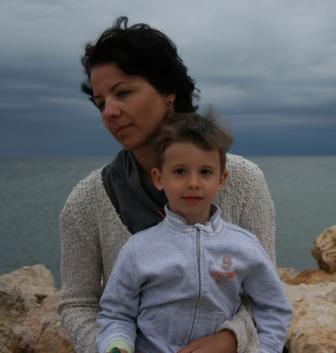GRESELILE PARINTILOR
Raspunsuri - Pagina 20


 sirimie spune:
sirimie spune:
Eu am impresia ca aici acum mamicile justifica toleranta lor pentru lucrurile daunatoare copiilor prin dragostea mare pe care le-o poarta. Nu uitati totusi ca parintii sint de vina cind copii sint obezi sau au carii. A fi parinte bun nu inseamna sa iti iubesti copilul neconditionat, ci sa faci ce e bine pentru el - chiar daca tie ca parinte asta iti cere sa faci un efort suplimentar.
Va dorim sa cresteti mari si frumosi! ![]()
Simona & Vladut (27 februarie 2005)
Poze la http://www.kodakgallery.com/I.jsp?c=akcecxh.f5u0t6d&x=0&y=nr5bn
Andrei are nevoie de ajutor: http://andrei.seek-on.com/ro
Despre Andrei
Sa ne rugam pentru Emma, zilnic orele 13


 anca_a spune:
anca_a spune:
Geta, foarte frumos ai scris. 
| Citat: |
| A fi parinte bun nu inseamna sa iti iubesti copilul neconditionat, ci sa faci ce e bine pentru el |
Dimpotriva, cel mai bun lucru pe care il poti face pentru copilul tau este sa il iubesti neconditionat.
Children's advocate


 Tia spune:
Tia spune:
eu am vrut sa spun ca e mai bine sa fim atente la reactiile copilului nostru si sa actionam specific, si sa nu consideram reguli sau retete ce spun alte persoane, specializate sau nu.
copilul trebuie iubit neconditionat, acest lucru neinsemnand ca nu faci tot ce este bine pentru el


 sirimie spune:
sirimie spune:
S-a inteles gresit ce am spus eu, reformulez
A fi parinte bun nu inseamna doar sa iti iubesti copilul neconditionat, ci sa faci ce e bine pentru el - chiar daca tie ca parinte asta iti cere sa faci un efort suplimentar.
Va dorim sa cresteti mari si frumosi! ![]()
Simona & Vladut (27 februarie 2005)
Poze la http://www.kodakgallery.com/I.jsp?c=akcecxh.f5u0t6d&x=0&y=nr5bn
Andrei are nevoie de ajutor: http://andrei.seek-on.com/ro
Despre Andrei
Sa ne rugam pentru Emma, zilnic orele 13


 conchita spune:
conchita spune:
| Citat: |
| citat din mesajul lui Tia eu am vrut sa spun ca e mai bine sa fim atente la reactiile copilului nostru si sa actionam specific, si sa nu consideram reguli sau retete ce spun alte persoane, specializate sau nu. copilul trebuie iubit neconditionat, acest lucru neinsemnand ca nu faci tot ce este bine pentru el |
excelent spus.



 anca_a spune:
anca_a spune:
| Citat: |
| citat din mesajul lui natynic Eu sunt de acord si cu Sirimie si cu Tia Dar hai sa mai vorbim si de alt fel de greseli... Imi cer anticipat scuze moderatoarei (Roxanaz) care a inchis subiectul, f delicat, daca cumva provoc aducandu-l aici in discutie, dar mie mi se pare ca mai erau multe de spus. Ati citit? http://forum.desprecopii.com/forum/topic.asp?TOPIC_ID=134288&whichpage=1 Naty mamica  Iuliei Elena-esenta tare in sticluta mica (30.01.2008) Iuliei Elena-esenta tare in sticluta mica (30.01.2008) DA-I DOAMNE MINUNII MELE SANATATE, MINTE SI NOROC! www.onetruemedia.com/shared?p=7f4020c8ca8fe8c9c90c20&skin_id=601&utm_source=otm&utm_medium=text_url" target="_blank">Primul an al Iuliei... |
Mi se pare foarte urat ce faci. Cum o tarasti pe Ciarli pe la alte subiecte in cautarea de senzational. Parca ii luai apararea...
Children's advocate


 Alexia27 spune:
Alexia27 spune:
Am citit subiectul mentonat si nu vreau sa-l discut aici. Am observat doar ca multe mame nu stiu cum sa securizeze casa pt pitici. Nu stiu daca e locul aici, dar cum subiectul oricum a deviat, nu stiu ce rau poate sa faca daca fac eu o listuta cu "ponturi": ce am facut noi pentru fata:
- aparatori la prize
- cartile mutate in locuri unde nu ajungea- pe masura ce crestea, mutam si cartile mai sus
-covorasele, carpetele etc aluncoase pot fi dublate de un material antiderapant (noi am luat de la Ikea)
-pentru fata am luat sosete cu antiderapant : sunt sfinte! lua fata niste viraje de ma lua pe mine ameteala
- cand era de inaltimea mesei am imbracat niste material colorat in burete si am protejat muchiile mesei (sa nu dea cu tampla de masa)
-am pus zavoare undeva sus la usile unde nu avea acces: gen debara, baie
-langa canapea am pus un covoras moale. Cum ii placea sa sara pe canapea ca pe trambulina, am zis sa amortizam eventuale busituri ![]()
-geamurile si balcoanele erau inchise si jos si sus
Cam atat imi amintesc acum din ce faceam. Daca exista interes pot detalia
Fii TU disponibil cand vrea copilul, nu-l fa pe el disponibil cand vrei tu!


 gecko spune:
gecko spune:
| Citat: |
| citat din mesajul lui Alexia27 Am citit subiectul mentonat si nu vreau sa-l discut aici. Am observat doar ca multe mame nu stiu cum sa securizeze casa pt pitici. Nu stiu daca e locul aici, dar cum subiectul oricum a deviat, nu stiu ce rau poate sa faca daca fac eu o listuta cu "ponturi": ce am facut noi pentru fata: - aparatori la prize - cartile mutate in locuri unde nu ajungea- pe masura ce crestea, mutam si cartile mai sus -covorasele, carpetele etc aluncoase pot fi dublate de un material antiderapant (noi am luat de la Ikea) -pentru fata am luat sosete cu antiderapant : sunt sfinte! lua fata niste viraje de ma lua pe mine ameteala - cand era de inaltimea mesei am imbracat niste material colorat in burete si am protejat muchiile mesei (sa nu dea cu tampla de masa) -am pus zavoare undeva sus la usile unde nu avea acces: gen debara, baie -langa canapea am pus un covoras moale. Cum ii placea sa sara pe canapea ca pe trambulina, am zis sa amortizam eventuale busituri -geamurile si balcoanele erau inchise si jos si sus Cam atat imi amintesc acum din ce faceam. Daca exista interes pot detalia Fii TU disponibil cand vrea copilul, nu-l fa pe el disponibil cand vrei tu! |
eu as mai adauga fixarea mobilei in perete...dulapuri, etajere. Produsele de la IKEA contin aceasta recomandare si au in seturi si dispozitivele necesare...din pacate in Romania nu e "la moda" sa strici zugraveala doar pentru siguranta copilului
 .
.


 khrisu spune:
khrisu spune:
N-am citit decat prima pagina..Cel mai prost articol.. pe ce studiu se bazeaza?? Cine e tanti asta?? Unde si-a facut studiile?? In ce secol?? ce note a luat la scoala?? ![]()
![]()
Am mai facut-o la un alt topic asa ca o sa ma repet: ![]()
![]()
Kathy's Commentaries
Sleeping through the Night
by Katherine A. Dettwyler, Ph.D.
Department of Anthropology,
Texas A & M University
****
[This essay was originally directed to one person. It has been edited slightly to make it less specific.]
I am an Adjunct (semi-retired) Associate Professor of Anthropology and Nutrition at Texas A&M University, and I do research on infant/child feeding beliefs/practices both cross-culturally and from an evolutionary perspective, as well as research on children's health and growth. I know from first-hand experience that being a new parent is a difficult time of adjustment, especially when expectations don't match reality, especially when our culture has taught us that children should have certain needs/wants/behaviors and then our children don't seem to fit that mold. This problem of a mismatch between expectations and reality can be very difficult for new parents to accept and adjust to. Sometimes, some children can be encouraged/convinced/forced to fit the mold of cultural expectations, and they do fine. Othertimes, though they do eventually fit the mold, it is at the expense of their sense of who they are, their self-confidence, their view of the world as a safe and trusting place, sometimes, even, at the expense of their health or life. Probably nowhere do cultural expectations and the reality of children's needs conflict more than in the two areas of breastfeeding frequency and sleeping behaviors.
Human children are designed (whether you believe by millions of years of evolution, or by God, it doesn't matter) -- to nurse *very* frequently, based on the composition of the milk of the species, the fact that all higher primates (Primates are the zoological Order to which humans belong, higher primates include monkeys and apes) keep their offspring in the mother's arms or on her back for several years, the size of the young child's stomach, the rapidity with which breast milk is digested, the need for an almost constant source of nutrients to grow that huge brain (in humans, especially), and so on. By very frequently, I mean 3-4 times per hour, for a few minutes each time. The way in which some young infants are fed in our culture -- trying to get them to shift to a 3-4 hour schedule, with feedings of 15-20 minutes at a time, goes against our basic physiology. But humans are very adaptable, and some mothers will be able to make sufficient milk with this very infrequent stimulation and draining of the breasts, and some children will be able to adapt to large meals spaced far apart. Unfortunately, some mothers don't make enough milk with this little nursing, and some babies can't adjust, and so are fussy, cry a lot, seem to want to nurse "before it is time" and fail to grow and thrive. Of course, usually the mother's body is blamed -- "You can't make enough milk" -- rather than the culturally-imposed expectation that feeding every 3-4 hours should be sufficient, and the mother begins supplementing with formula, which leads to a steady spiral downward to complete weaning from the breast. Human children are also designed to have breast milk be a part of their diet for a minimum of 2.5 years, with many indicators pointing to 6-7 years as the true physiological duration of breastfeeding -- regardless of what your cultural beliefs may be. I can provide you with references to my research on this topic if you wish to read more.
The same is true of sleeping. Human children are designed to be sleeping with their parents. The sense of touch is the most important sense to primates, along with sight. Young primates are carried on their mother's body and sleep with her for years after birth, often until well after weaning. The expected pattern is for mother and child to sleep together, and for child to be able to nurse whenever they want during the night. Normal, healthy, breastfed and co-sleeping children do not sleep "through the night" (say 7-9 hours at a stretch) until they are 3-4 years old, and no longer need night nursing. I repeat -- this is NORMAL and HEALTHY. Dr. James McKenna's research on co-sleeping clearly shows the dangers of solitary sleeping in young infants, who slip into abnormal patterns of very deep sleep from which it is very difficult for them to rouse themselves when they experience an episode of apnea (stop breathing). When co-sleeping, the mother is monitoring the baby's sleep and breathing patterns, even though she herself is asleep. When the baby has an episode of apnea, she rouses the baby by her movements and touch. This is thought to be the primary mechanism by which co-sleeping protects children from Sudden Infant Death Syndrome. In other words, many cases of SIDS in solitary sleeping children are thought to be due to them having learned to sleep for long stretches at a time at a very early age, so they find themselves in these deep troughs of sleep, then they may experience an episode of apnea, and no one is there to notice or rouse them from it, so they just never start breathing again. Co-sleeping also allows a mother to monitor the baby's temperature during the night, to be there if they spit up and start to choke, and just to provide the normal, safe environment that the baby/child has been designed to expect.
Is this convenient for parents? No!
Is this difficult for some new parents to adjust to? Yes!
No doubt about it, the gap between what our culture teaches us to expect of the sleep patterns of a young child (read them a story, tuck them in, turn out the light, and not see them again for 8 hours) and the reality of how children actually sleep if healthy and normal, yawns widely.
But the first steps to dealing with the fact that your young child doesn't sleep through the night, or doesn't want to sleep without you is to realize that:
* (1) Not sleeping through the night until they are 3 or 4 years of age is normal and healthy behavior for human infants.
* (2) Your children are not being difficult or mani****tive, they are being normal and healthy, and behaving in ways that are appropriate for our species.
Once you understand these simple truths, it becomes much easier to deal with parenting your child at night. Once you give up the idea that you must have 8 hours of uninterrupted sleep at night, and view these nighttime interactions with your child as precious and fleeting, you get used to them very quickly.
I highly recommend Dr. Sears' book on Nighttime Parenting [available from the La Leche League International Catalogue]. Our children's early years represent the most important and influential time of their lives. It passes all too quickly. But meeting your child's needs during these first few years will pay off in many ways in the years to come.
KHRISU mamik de baietel si fetita 


 Alexia27 spune:
Alexia27 spune:
Gecko, ![]() corect, de asta am uitat. Iar gaurile ramase se astupa foaarte usor...
corect, de asta am uitat. Iar gaurile ramase se astupa foaarte usor...
Fii TU disponibil cand vrea copilul, nu-l fa pe el disponibil cand vrei tu!
